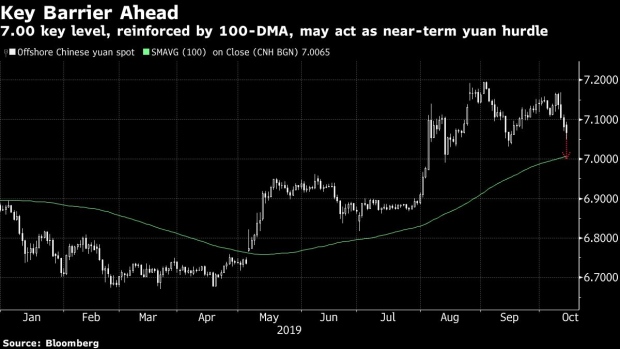Oct 14, 2019
Yuan Is Key to Gauging Whether China-U.S. Deal Is Real Thing
, Bloomberg News

(Bloomberg) -- Investors are looking to China’s daily fixing of the yuan for a sign of goodwill toward the U.S. after President Donald Trump said a phase-one trade deal had been reached.
So far, the signs aren’t too positive.
The People’s Bank of China fixed the yuan at almost exactly the same rate on Monday as they did on Friday. A stronger fix would have allayed concern they are manipulating the currency to boost exports.
All eyes now turn to Tuesday’s fix. In the onshore spot market on Monday, the yuan appreciated for a fifth day to 7.0670 per dollar, stronger than the 7.0725 fixing. The offshore yuan also extended a four-day winning streak to trade at 7.0683 per dollar.
“The PBOC may now revert to quietly shoring up the currency as a gesture of goodwill,” said Julian Evans-Pritchard, senior China economist at London-based Capital Economics Ltd.
China wants to hold more talks to iron out the details of a deal touted by Trump before agreeing to sign it, according to people familiar with the matter.
Treasury Secretary Steven Mnuchin indicated on Friday that he’ll consider lifting a U.S. designation that China manipulates its currency once the first phase of a trade agreement is complete.
Still, Evans-Pritchard is skeptical that Beijing and Washington are any closer to a lasting resolution, and he’s far from the only one.
A comprehensive trade deal before America’s 2020 election seems unlikely, Citigroup analysts Lu Sun and Gaurav Garg said in a client note. The currency pact in the phase-one agreement will likely entail a commitment not to devalue the yuan, instead of “forced, one-way” yuan appreciation, Citi said. Bullish momentum for the offshore yuan could extend for a bit, though obstacles to the currency staying strong past 7.0 per dollar seem high, according to the analysts.
Deutsche Bank AG described the pact agreed over the weekend as “very limited” and noted that it won’t be signed for several weeks.
“Not many businesses that have been disturbed by the trade war will yet be able to see a clear pathway ahead,” Deutche Bank strategists, including London-based Jim Reid and Craig Nicol, said in a note to clients. We’re not “close to solving many of the bigger issues behind the conflict.”
To contact the reporters on this story: Paul Wallace in Dubai at pwallace25@bloomberg.net;George Lei in New York at glei3@bloomberg.net
To contact the editors responsible for this story: Dana El Baltaji at delbaltaji@bloomberg.net, Philip Sanders
©2019 Bloomberg L.P.